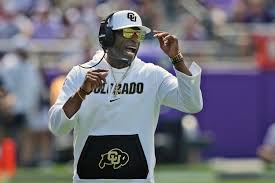The Evolution of Deion Sanders: From Player to Coach

Introduction
Deion Sanders is a name that resonates with both football fans and sports enthusiasts alike. Known for his electrifying playing style, Sanders, often referred to as ‘Prime Time,’ has made significant contributions to the world of American football as both a player and, more recently, a coach. His journey reflects the changing dynamics of professional sports and his ongoing influence in the realm of college athletics.
Career Milestones
Born on August 9, 1967, in Fort Myers, Florida, Sanders showcased remarkable athletic ability from a young age. He played college football at Florida State University, where he won accolades that would set the stage for a successful professional career. Sanders was selected fifth overall in the 1989 NFL Draft by the Atlanta Falcons and quickly became known for his exceptional defensive skills and flamboyant personality.
Throughout his NFL career, Sanders played for several teams, including the San Francisco 49ers, Dallas Cowboys, Washington Redskins, and Baltimore Ravens. He was a two-time Super Bowl champion and an eight-time Pro Bowl selection. His agility and quickness made him one of the most feared cornerbacks in the league, and he remains one of only a few athletes to play in both the NFL and Major League Baseball (MLB).
Transition to Coaching
After retiring from professional play, Sanders remained involved in sports but shifted his focus towards coaching. In 2020, he was appointed head coach of the Jackson State University football team, where he aimed to revitalise the programme and attract top talent. Under his leadership, Jackson State has seen a surge in recruitment, with several new players expressing interest in the historically black college due to Sanders’s high profile and charismatic recruiting style.
In 2023, Deion Sanders made headlines when he accepted the head coach position at the University of Colorado Boulder, demonstrating that he is not only committed to building winning teams but also to advocating for minority representation in coaching roles across the nation. His time at Jackson State was marked by several championship victories and a noticeable increase in attendance and fan engagement.
Conclusion
As Deion Sanders continues his coaching career, his impact on football, both on and off the field, is undeniable. He has become a role model for aspiring athletes and coaches, exemplifying the importance of giving back to the community and fostering the next generation of talent. Looking forward, Sanders’s innovative coaching strategies and emphasis on player development may well reshape college football and inspire future sports figures to follow in his footsteps. The significance of his journey both as an athlete and as a coach cannot be overstated, making him a vital part of the sports narrative for years to come.







